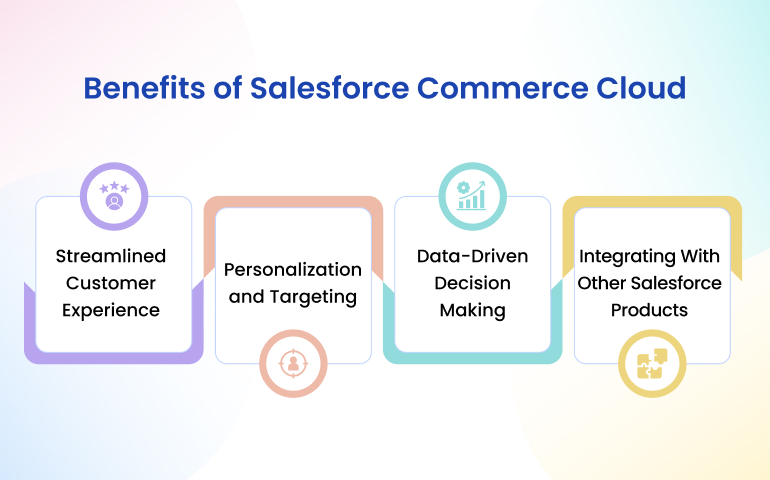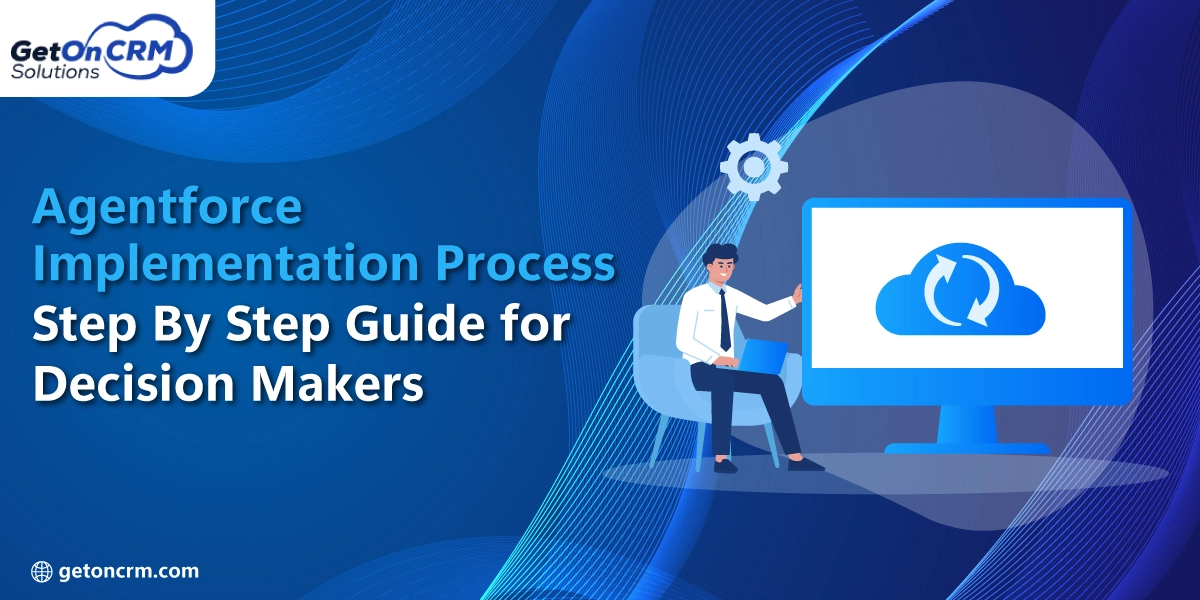Salesforce CRM provides businesses with a leading cloud customer relationship management (CRM) platform to optimize sales, marketing, and customer service operations and drive growth in business operations through tools and solutions tailored specifically for customer interactions – such as optimizing interactions, increasing productivity, and driving business expansion.
Business-to-Business (B2B) and Business-to-Customer (B2C) commerce represent distinct electronic commerce models. B2B refers to transactions between two businesses where one sells their products or services directly, while B2C refers to transactions between businesses and individual consumers.
Salesforce Commerce Cloud services offer businesses an effective tool to efficiently manage and optimize their online sales channels.
Salesforce Commerce Cloud offers a seamless shopping experience for B2B and B2C customers, helping businesses increase customer engagement, sales growth, and revenue expansion. Businesses can enhance customer engagement by taking advantage of Salesforce Commerce Cloud capabilities while driving revenue growth.
Understanding Salesforce Commerce Cloud
Definition and Key Features
Salesforce Commerce Cloud is a comprehensive commerce solution that empowers businesses to easily build, optimize, and operate online storefronts. It includes catalog management, order processing, pricing/promotions management, and customer support tailored to B2B and B2C environments.
Benefits of Salesforce Commerce Cloud
Streamlined Customer Experience
Salesforce Commerce Cloud services provide an intuitive user interface, providing customers with an enjoyable shopping experience. Businesses can leverage it to offer tailored product recommendations, straightforward navigation, and efficient checkout processes that enhance customer satisfaction and loyalty, increasing satisfaction and retention rates.
Personalization and Targeting
Businesses can leverage customer data with Salesforce Commerce Cloud to deliver customized experiences for each customer. By understanding customer behavior and preferences, businesses can tailor product recommendations, pricing, promotions, and special offers directly to individual customers for enhanced conversion rates and customer engagement.
Integrating With Other Salesforce Products
Salesforce Commerce Cloud integrates seamlessly with other Salesforce products like CRM and marketing automation tools, providing businesses with a way to streamline sales and marketing processes, sync customer data across touchpoints, and create cohesive customer journeys across multiple touchpoints.
Data-Driven Decision Making
In particular, Salesforce Commerce Cloud features robust analytics and reporting features for making informed decisions quickly.
Businesses can leverage data-driven insights into sales performance, customer behavior, and trends to make data-driven decisions that optimize sales strategies, product offerings, and marketing campaigns.
Also Read: How Salesforce Commerce Cloud Can Revolutionize Your Online Business
Key Components of Salesforce Commerce Cloud
Storefront and Catalog Management
Creating an Engaging Storefront
Salesforce Commerce Cloud consultant enables businesses to design and customize visually appealing storefronts that align with their brand identity. It offers flexible templates, responsive design options, and rich media capabilities, ensuring an engaging and immersive online shopping experience.
Managing Product Catalogs and Inventory
Businesses can efficiently manage their product catalogs and inventory with Salesforce B2B B2C Commerce. It allows easy catalog creation, categorization, and updating of product information. Additionally, real-time inventory management helps businesses prevent overselling and ensures accurate stock availability.
Order Management
Efficient Order Processing
Salesforce Commerce Cloud streamlines order processing, automating tasks such as order creation, payment processing, and fraud detection. It gives businesses a centralized view of orders, enabling efficient order management and fulfillment.
Pricing and Promotions
Dynamic Pricing Strategies
Salesforce Commerce Cloud allows businesses to implement dynamic pricing strategies. They can set up rules and conditions to offer personalized pricing based on customer segments, purchase history, or order quantity. This flexibility helps businesses optimize their pricing strategies and maximize revenue.
Promotions and Discounts
With Salesforce B2B B2C Commerce, businesses can easily create and manage promotional campaigns. They can offer discounts, coupons, or special offers to incentivize purchases and drive customer engagement. The platform provides the tools to set up and track promotions, ensuring accurate and effective campaign management.
Customer Service and Support
Providing Exceptional Customer Service
Salesforce Commerce Cloud empowers businesses to deliver exceptional customer service. It provides:
- Tools for managing customer inquiries.
- Tracking support tickets.
- Facilitating timely and effective responses.
The platform enables businesses to prioritize customer satisfaction and build long-term relationships.
Self-Service Options and Knowledge Base
Salesforce Commerce Cloud enables businesses to offer self-service options to customers. They can provide a comprehensive knowledge base, FAQs, and community forums to empower customers to find answers and resolve issues independently. It reduces the need for direct customer support and enhances overall customer satisfaction.
Integrations with Salesforce Commerce Cloud
CRM Integration
Syncing Customer Data
Integrating Salesforce Commerce Cloud with a CRM system allows businesses to synchronize customer data seamlessly. It ensures that customer information, order history, and interactions are shared between the commerce platform and the CRM. This integration provides a unified view of the customer and enables personalized experiences.
Leveraging Customer Insights for Personalized Experiences
By integrating with CRM, businesses can leverage customer insights stored in the CRM to deliver personalized experiences through Salesforce Commerce cloud services. They can use customer data, such as preferences, purchase history, and demographic information, to tailor product recommendations, pricing, and promotions.
Marketing Automation Integration
Targeted Marketing Campaigns
Salesforce Commerce Cloud integration with marketing automation tools, enabling businesses to create targeted marketing campaigns. They can leverage customer data from the commerce platform to segment customers, automate email marketing, and deliver personalized content. This integration enhances marketing effectiveness and drives customer engagement.
Lead Generation and Nurturing
Integrating Salesforce Commerce Cloud with marketing automation tools facilitates lead generation and nurturing. Businesses can capture leads through various touch points within the commerce platform and nurture them through personalized marketing campaigns. This integration streamlines the lead management process and helps businesses convert leads into customers.
Analytics and Reporting Integration
Monitoring Performance and KPIs
Salesforce Commerce Cloud integrates with analytics and reporting tools, enabling businesses to monitor performance and key performance indicators (KPIs). By tracking metrics such as conversion rates, average order value, and customer acquisition cost, businesses can gain valuable insights into the effectiveness of their sales and marketing strategies.
Optimizing Sales and Marketing Strategies
Integrating Salesforce Commerce Cloud with analytics and reporting tools allows businesses to optimize their sales and marketing strategies. They can identify areas for improvement, uncover trends, and make data-driven decisions to enhance customer engagement, increase sales, and drive revenue growth.
Also Read: Seize Salesforce: Boost Customer Experiences & Retail Business Growth
Solutions Provided and Outcomes Achieved
An Enterprise Leveraging Salesforce Commerce Cloud
Business Objectives
An Enterprise desired to increase its online presence, increase customer engagement and drive revenue growth. They recognized Salesforce Commerce Cloud’s potential to accomplish these goals and implemented them into their operations. Results and Impact on Organization
Utilizing Salesforce Commerce Cloud services, the enterprise saw significant results:
Expanded Customer Reach: Thanks to its user-friendly storefront and tailored experiences, the firm was able to attract new customers and expand its customer base significantly. By effectively targeting both B2B clients and individual consumers, their reach widened even further.
Improved Marketing Campaigns: Integration of Salesforce Commerce Cloud with automation tools enabled an enterprise to execute targeted marketing campaigns with higher click-through rates, increased conversions, and an improved return on their efforts.
Streamlined Operations: The platform’s management capabilities enabled efficient order processing and fulfillment, thus decreasing processing times while increasing operational efficiencies overall.
Data-Driven Decision-Making: By harnessing the analytics and reporting capabilities of their platform, the enterprise gained insights into customer behavior, sales performance, and marketing effectiveness – giving them the power to make data-driven decisions that would optimize strategies and promote continuous improvement.
Salesforce Commerce Cloud was integral to their company’s expansion, helping them meet their business objectives and establish an impressive online presence.
Best Practices for Salesforce Commerce Cloud Implementation
Successful implementation of Salesforce Commerce Cloud involves following these best practices:
Defining Business Goals and Objectives
Before implementing Salesforce Commerce Cloud, it is crucial to clearly define business goals and objectives. It helps align the implementation strategy with the organization’s vision and ensures the platform is customized to meet specific requirements.
Mapping Customer Journeys and Experiences
Understanding the customer journey and mapping customer experiences is essential for designing an effective storefront and optimizing the user experience. Businesses can tailor their offerings to meet customer expectations and deliver personalized experiences by identifying touchpoints and pain points.
Customization and Configuration
Businesses should leverage Salesforce Commerce Cloud’s customization and configuration capabilities to tailor the platform to their specific needs. It includes:
Branding and design: Customize the look and feel of the storefront to align with the company’s branding and create a consistent brand experience for customers.
Product catalog management: Management configures product catalogs to showcase the right products to customers, ensuring accurate and up-to-date information.
Pricing and promotions: Set up pricing rules, discounts, and promotional campaigns that align with the business’s pricing strategies and objectives.
Workflow and processes: Process configures workflows and processes within the platform to streamline order management, fulfillment, and customer service operations.
By customizing and configuring Salesforce Commerce Cloud, businesses can create a unique and tailored experience for their customers.
Testing and Optimization Strategies
Testing and optimization are crucial to ensure the success of Salesforce Commerce Cloud implementation. Businesses should:
Conduct thorough testing: Test the platform extensively to identify and resolve any issues or bugs before the launch. It includes testing the storefront, order management, integrations, and customer journey.
Collect and analyze data: Gather data from the platform’s analytics and reporting tools to gain insights into customer behavior, sales performance, and marketing effectiveness. Analyze the data to identify areas for improvement and optimization.
Continuously optimize: Use the insights from data analysis to make informed decisions and optimize various aspects of the commerce platform. It includes refining customer journeys, improving user experience, and enhancing marketing campaigns.
By implementing testing and optimization strategies, businesses can ensure Salesforce Commerce Cloud’s ongoing success and performance.
Future Trends and Innovations for Salesforce Commerce Cloud
Salesforce Commerce Cloud continues its rapid development, and multiple future trends and innovations have emerged as it matures:
Enhance Mobile Experiences
Mobile commerce continues to evolve quickly, necessitating businesses to prioritize mobile experiences for maximum growth. Salesforce Commerce Cloud integration supports responsive design principles, such as responsive mobile optimization strategies that ensure an effortless user journey across devices.
Voice Commerce and Chatbots
Both voice commerce and chatbots have gained in popularity as more customers interact with businesses through voice assistants and chat platforms like Salesforce Commerce Cloud
Salesforce Commerce Cloud’s voice commerce features allow customers to purchase goods through voice commands; Chatbots are being utilized to enhance customer support services by offering instant assistance when needed.
Personalization and Hyper-Targeting
Customized experiences, product recommendations, and targeted marketing campaigns have become essential to business operations today.
Salesforce Commerce Cloud uses customer data and advanced algorithms to offer customized experiences, product suggestions, and targeted campaigns to boost customer engagement while increasing conversions. This level of personalization enhances customer engagement while driving increased conversions.
Conclusion
Expert Salesforce consultants, such as GetOnCRM, provide Salesforce Commerce Cloud services and offer a comprehensive platform to manage and optimize B2B and B2C commerce operations. These consultants integrate essential components like storefront and catalog management, order management, pricing and promotions, and customer service and support. Businesses can streamline processes, enhance customer experiences, and drive growth through their expertise.
The platform’s integrations with CRM, marketing automation, and analytics tools further enhance its capabilities, enabling businesses to leverage customer data, run targeted campaigns, and make data-driven decisions. Real-world use cases and success stories demonstrate the positive impact of Salesforce Commerce Cloud implementation on businesses, leading to increased customer satisfaction, improved operational efficiency, and revenue growth.
Frequently Asked Questions on “Integrating Business Operations with Salesforce Commerce Cloud”
What is Salesforce Commerce Cloud best used for in business operations?
It’s used to build and manage online storefronts, optimize catalog/inventory, streamline order processing, and personalize customer shopping experiences in both B2B and B2C contexts.
How does Commerce Cloud help improve customer experience?
By offering intuitive storefronts, personalized recommendations, efficient checkout flows, and consistent cross-channel experience.
Can Commerce Cloud integrate with other Salesforce tools?
Yes — it integrates with CRM, marketing automation, analytics tools, etc., enabling unified customer journeys and data-driven decisions.
How does product catalog and inventory management work?
Commerce Cloud offers tools for real-time inventory tracking, catalog categorization, responsive storefronts, which helps reduce stock issues and keep customer expectations aligned.
Why is pricing strategy and promotions easier with Commerce Cloud?
It supports dynamic pricing rules, customer-segment based promotions, coupons/discounts and integrates those offers seamlessly into the storefront and checkout process.
What are important best practices for implementing Commerce Cloud?
Define clear business objectives, understand customer journey mapping, thoroughly test, configure workflows well, and continuously optimize based on analytics.
























